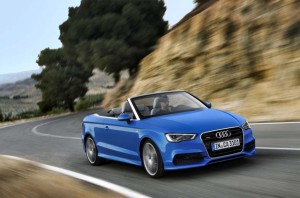
The diesel version of the Audi A3 is one of the vehicles facing recall to fix a "defeat device" in its emissions control system.
Volkswagen will have to recall about 500,000 diesel-powered vehicles, the government has declared, because it surreptitiously equipped them with software designed to detect when they were undergoing emissions testing and later allow the vehicles to emit higher levels of pollution.
The Environmental Protection Agency has issued a notice of violation alleging that VW created a “defeat device,” more accurately software that could detect when a vehicle was undergoing emissions testing. In such a situation, the onboard pollution control system would operate more aggressively. Otherwise, the government alleges, those controls would be relaxed.
“Using a defeat device in cars to evade clean air standards is illegal and a threat to public health,” said Cynthia Giles, an assistant administrator with the EPA’s Office of Enforcement and Compliance.
Diesel technology, while wildly popular in Europe, had largely vanished from the U.S. market until recently because of the high levels of particulates and oxides of nitrogen the engines naturally produce. VW has been one of the most aggressive manufactures in reviving the U.S. diesel market, claiming its pollution control technology could meet the latest emissions standards.
(Calif backs off major cuts in petroleum usage. Click Here for the full story.)
The challenge has been to ensure that such so-called “Clean Diesels” would deliver the level of performance customers demand, while maintaining the higher fuel economy that is one of the big selling points for diesel technology.
Apparently, the government claims, VW was able to meet the often conflicting needs for low emissions, high mileage and good performance by tricking regulators during routine testing. The government has a set series of tests that the defeat devices could detect and then temporarily turn on full emissions control. Under all other circumstances, the control systems would be defeated or at least relaxed.
The German automaker acknowledged it has received notice of the recall order and said in a statement it “cooperating with the investigation; we are unable to comment further at this time.”
(VW, Audi plan to “electrify” their entire line-ups. Click Here for more.)
The recall covers 482,000 vehicles equipped with 4-cylinder diesel engines, including the VW Jetta, Beetle and Golf models sold during the 2009 to 2014 model-years, the Audi A3 sold during the same period, and the 2014-15 VW Passat.
The EPA, the State of California and the U.S. Justice Department are investigating the allegation. It’s not clear if further action could follow.
But federal regulators and legal authorities have begun taking a tougher stance when the auto industry violates emissions and safety regulations. Justice this week agreed to settle a criminal investigation into General Motors’ handling of a deadly ignition switch defect only after the maker agreed to three years of probation and a $900 million fine. Fiat Chrysler earlier this year paid a record fine to the National Highway Traffic Safety Administration for mishandling numerous safety recalls.
Last November, Korean carmakers Hyundai and Kia paid a combined $300 million fine for overstating th fuel economy of 1.2 million vehicles. They spent millions more to compensate owners. Ford Motor Co. also came under fire for false mileage claims on a number of its vehicles.
(For more on GM’s ignition switch settlement, Click Here.)

If the fix for this cuts the performance of these cars (don’t see how it could adversely affect mileage) they may have a hard time getting them brought in. Don’t know if they do emissions checks on diesels (no emissions test, or any other inspection in this state) but they might have to devise a method to read whether the car has been re-flashed at that time.
This should be an interesting case… If the software by-pass does not produce higher emissions than allowed, then it’s essentially semantics. If the emissions is excessive however, VW should pay big for this issue.
EPA should check out Mercedes as well. Seems to be regarded as sport in Europe to game fuel economy numbers, which are part of type approval. But note that the emission control scam is regarded as old news – a brief mention is made in this posting. The real problem is fuel economy gaming.
http://www.autoblog.com/2014/11/09/mercedes-named-number-1-cheat-on-europes-fuel-economy-test/
The problem with mpg ratings is that there is no means to accurately test to the same conditions as consumers drive because there is up to a 30% difference in mpg based on driving style alone. Then when you enter variable climatic conditions into the mix you can easily get a 50% total variation in mpg results, which is huge.
Any auto maker who properly conducts the EPA test cycle for their cars, should be able to state the results of those EPA results and not be punished because consumer results vary from the EPA test results. Anyone caught cheating on mpg (or emissions) test should be severely fined. Car makers however can not be responsible for how people drive their vehicles.
The EPA and other rating authorities need to educate consumers that the EPA or similar tests are only a representative mpg rating and that their mileage WILL vary and may not equal the EPA rating in a controlled test under controlled climatic conditions. Even though the Window Sticker has stated for decades that: You Mileage May Vary” (YMMV), from the EPA results, people pay no attention to this disclaimer. The failure of the EPA to educate consumers is what allows the siren chasers to profit from using technically ignorant consumers who expect the EPA ratings to be exactly what they will experience.